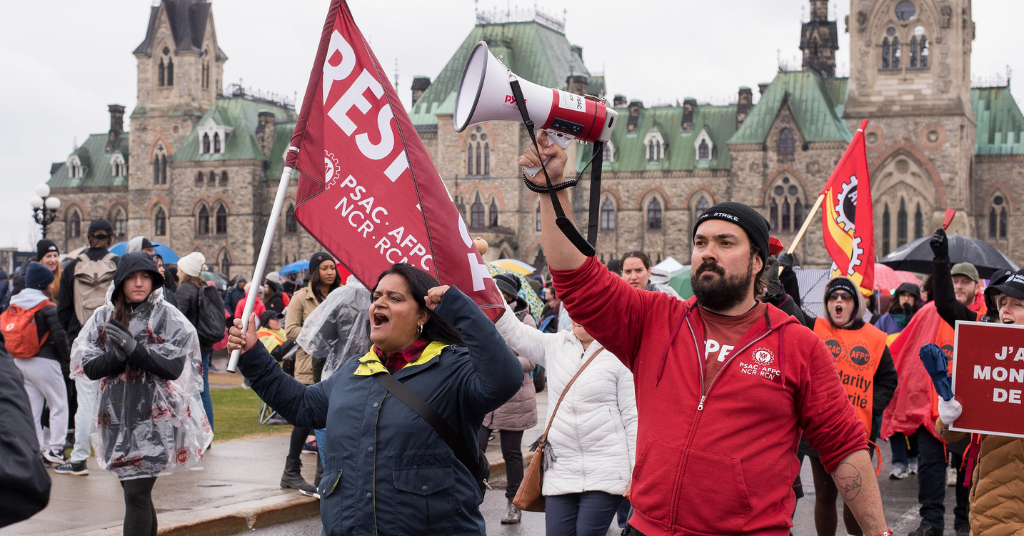
Public Servants Forced Federal Government to Improve Deal By Going on Strike, Labour Experts Say
“Workers do have power and can resist — you don’t have to just take whatever the employer says”
A national general strike by public servants has successfully pressured the federal government to “sweeten the pot” and improve wages and working conditions for workers, labour experts say.
On Monday, the Public Service Alliance of Canada announced a tentative agreement with the federal government, bringing an end to one of the largest strikes in Canadian history. Workers returned to work at 9 AM Monday, though the agreement will not be official until it is ratified by the members through a vote.
Over 120,000 federal workers in the Treasury Board will vote on a tentative agreement that includes wage increases higher than the government’s original offer, improved language for remote work policies, increased shift premiums, and more.
However, 35,000 CRA workers represented by PSAC remain on strike, still negotiating over telework policies, fair wages and job protections. CRA picket lines are located through the union’s website.
The strike of over 100,000 workers “appears to have moved the federal government to sweeten the pot in order to reach a deal,” Brock University labour professor Larry Savage told PressProgress.
PSAC has reached a tentative agreement for the PA, SV, TC and EB bargaining units at Treasury Board.
Members in the PA, SV, TC and EB bargaining groups are required to return to work for their next scheduled shift, beginning May 1 at 9 a.m. ET
Read more: https://t.co/sgsgv65FBl
— PSAC-AFPC (@psac_afpc) May 1, 2023
Over the weekend, the federal government raised its offer from 9% to 10% wage increases over three years, plus an additional 2.5% raise for a fourth year. The tentative agreement also includes a one time lump sum payment for workers approaching retirement, market adjustments for certain positions and an increase to shift premiums.
“The result is significant,” Savage says.
“The union and its membership clearly benefited from the strike action given the improved offer in the tentative agreement.”
“The total compounded wage increase is one of the highest negotiated in the public sector. So while it failed to keep pace with inflation it represented a much higher number than we’ve seen in recent rounds of negotiation.”
‘It’s been a rough couple of years’: Striking federal workers speak out from picket lines across Canada.
‘We are here to remind the public that what we get, they will reap the benefit of it. I guarantee it.’https://t.co/44jB7b9JD5 #canlab #cdnpoli
— PressProgress (@pressprogress) April 19, 2023
The tentative agreement also includes improved remote work policies “that requires managers to assess remote work requests individually, not by group, and provide written responses that will allow members and PSAC to hold the employer accountable to equitable and fair decision-making on remote work.”
“Had the strike not resulted in an improved offer on wages and remote work, it would have represented a step backwards for the labour movement,” Savage says. “This result gives the union a base from which to continue fighting for improved terms and conditions of work moving forward.”
“What PSAC members say about the deal is what matters most,” Savage notes.
Canadian Centre for Policy Alternatives’ Ontario Director Randy Robinson says the strike sent a message to the public that “workers do have power and can resist” the status quo. A recent CCPA study noted federal public sector wages, adjusted for inflation, were no better now than in 2007.
“At a time when corporate profits and inflation are both high, PSAC decided to do something about it, and I think that sends a message to the public that workers do have power and can resist — you don’t have to just take whatever the employer says,” Robinson told PressProgress.
“While all strikes have an initial up-front cost to workers, the gains that this strike produced — and it was a short strike — are now built in to the wage grid for decades to come.”
Federal public sector workers’ wages no better now than in 2007, new report shows.
“No other industry—none—has seen average inflation adjusted wages pushed back as far as federal public sector workers.”https://t.co/frfP1iI7jx #canlab #cdnpoli #ottnews
— PressProgress (@pressprogress) April 21, 2023
“The lump-sum payment is not built in but will improve pensions for workers in the last five years of their careers,” Robinson added.
Protections against contracting out are also included in the tentative agreement: “PSAC members will not lose their job if they can perform the duties of a contractor already working with the federal government.”
Improvements to equity and diversity training and paid leave for Indigenous cultural practices are also included.
More details about the agreement will be released in the coming days. PSAC members will now begin the process to vote on whether to accept the agreement.
Robinson also hopes the strike sends a message that the argument that rising wages cause inflation is “irrational.”
“If the government is looking for ways to tame inflation it should be taxing excess profits, not suppressing the wages of people who are just trying to pay the rent or feed their families,” Robinson said.
“Workers’ wages are not driving inflation, profits are.”
Our journalism is powered by readers like you.
We’re an award-winning non-profit news organization that covers topics like social and economic inequality, big business and labour, and right-wing extremism.
Help us build so we can bring to light stories that don’t get the attention they deserve from Canada’s big corporate media outlets.
Donate



